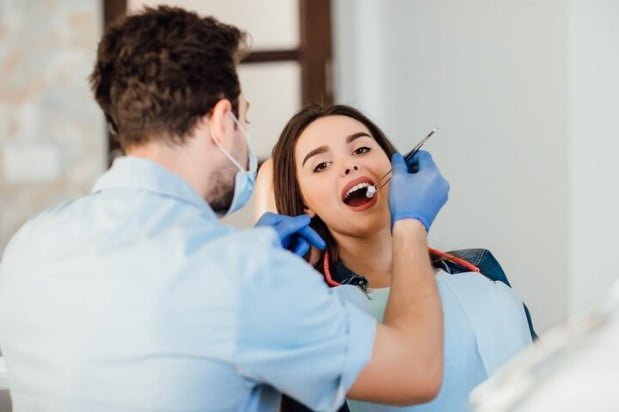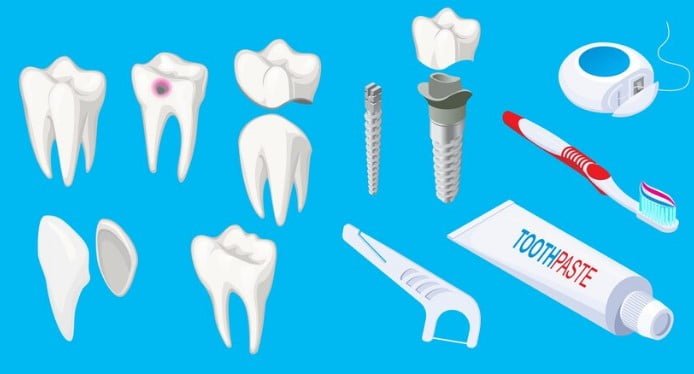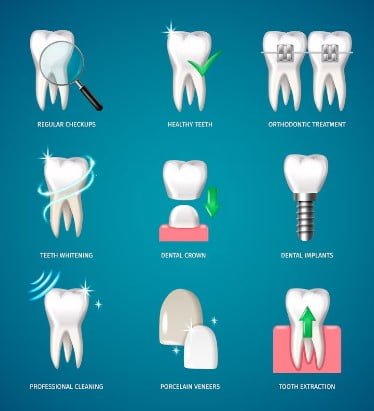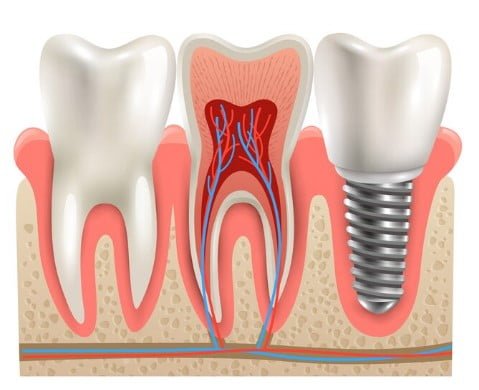
These have made it possible for dental patients with missing teeth to have permanent and stable false tooth replacements. Just like natural teeth, they require constant care in order to last long and maintain oral health. This detailed guide will take you through the process of keeping your All-on-4 dental implants clean so that your smile can remain healthy and vibrant throughout the years.
All-On-4 dental implants are a common option for individuals seeking to restore their smiles and regain self-esteem. Unlike conventional dentures, All-On-4 implants stay fixed hence giving them more natural form and feel. However, with great benefits comes great responsibility—adequate cleaning and maintenance are essential in preventing complications such as peri-implantitis as well as maintaining the longevity of these implants.
What is Meant by All-On-4 Dental Implants?
Four titanium posts placed into the jawbone support an entire row of artificial teeth known as all on 4 dental implants. There are several advantages associated with this technique including:
Stability
These prosthetic teeth are strongly held by the fused implant in the jawbone.
Aesthetics
The fake teeth resemble real ones both visually and when touched.
Functionality
One can speak, eat or even smile confidently without having to worry about prosthesis slippage or falling out.
However, such benefits can only be realized if cleanliness is maintained around these implants as well as neighboring tissues.

Reasons behind Proper Hygiene
Maintaining good hygiene practices around your All-on-4 dental implants goes a step further than appearance alone. Regular appropriate cleansing offer several advantages including:
Prevention of Peri-Implantitis – similar to gum disease but if untreated could lead to implant failure
Prolonging Life Span – caring for them correctly may significantly increase lifespan of your new structure
Overall Oral Health – proper oral hygiene contributes towards better general health and thereby reduces chances of contracting other dental issues or systemic diseases
Fresh Breath – when you regularly clean these, food remains and bacteria are removed thus helping to keep your breath fresh.
How to Clean All-On-4 Dental Implants
The process of cleaning All-on-4 dental implants consists of numerous steps that demand certain skills as well as tools for the job. This is a step by step guide that allows you to maintain your implants in good condition:
Brush Your Implants Twice Daily
All on 4 teeth need to be brushed at least twice per day just like natural ones. To avoid harming the prosthetic teeth and surrounding gum, use a soft bristled toothbrush together with non-abrasive toothpaste.
Technique:
At 45 degrees against the gum line hold the brush gently rotate it. Ensure that all sides of the dentition including posterior, anterior and occlusal are brushed.
Timing:
At least two minutes should be spent brushing during each session for complete cleanliness.
Tools:
You may consider using an electric brush because it can remove plaque and other residues more effectively than manual one.
Floss Daily
To get rid of stuck food particles and plaques from between artificial teeth or around implant sites requires flossing daily. Use a floss threader or interdental brushes since these areas are difficult to reach with conventional flosses.
Floss Threader:
It guides floss under your bridge. Pass it back and forth gently for debris removal purposes.
Interdental Brushes:
These small brushes are designed to clean between the teeth and around the implants. Select a size which does not hurt but feel comfortable instead.
Water Flossing
A water flosser, also known as an oral irrigator, could be a valuable tool to add to your dental hygiene routine. It employs a stream of water in taking out plaque and food particles that surround the implants and lie beneath the prosthetic bridge.
Approach:
Run the water flow along the gum line and through the spaces between artificial teeth. Commence by selecting minimal pressure and adjust until comfortable.
Rate:
You can use it once in 24 hours before going to bed.
Use an Antibacterial Mouthwash
To keep bacteria at bay and avoid infections on implant sites rinse your mouth with an antibacterial mouthwash.
Variety:
Select only alcohol-free mouthwashes specifically manufactured for those with dental implants.
Rate:
Rinse twice daily for about half a minute after brushing using toothpaste and flossing.
Dental Check-Ups Regularly
If you want your All-on-4 implants to last longer, it is important to have regular check-ups to ensure proper maintenance of these implants.
Rate:
Schedule your check-up every six months or as per dentist’s advice.
Professional Cleaning:
At this time, either dentist or hygienist will carry out thorough cleaning so that you can remove any deposits of plaque or tartar which might have been missed during your daily oral care routine.
Keep Your Diet Healthy
Diet has an imperative role in oral health. Avoiding sugary or acidic foods that are associated with plaque development as well as gum disease is vital while taking into account natural sources like fresh fruits, vegetables, lean proteins, whole grains etc.,
Hydration:
Drink plenty of water so that you mouth can always be moistened and food particles flushed away easily.
Quit Smoking:
Smoking has been found to increase chances of failure leading to oral issues among them being implant damage

FAQs
How often do I have to maintain my All-on-4 dental implants?
Clean your All-on-4 dental implants at least twice per day. You should brush, floss and rinse with mouthwash as part of your everyday routine.
Can I use regular toothpaste on my All-on-4 implants?
Yes, you can use the regular toothpaste but it should not be abrasive so as not to destroy the prosthetic teeth plus their neighboring gum areas.
Are there any special brushes for cleaning All-on-4 implants?
To avoid hurting the gums and causing damage to the crowns a soft-bristled brush is recommended. Also an electric toothbrush would help in better cleaning of these areas.
How often should I visit my dentist for check-ups?
Regular check-ups are to be planned for every six months or upon advice from your dentist. They will help monitor your implant’s health and even give you a professional cleaning session.
Can I use a water flosser instead of traditional flossing?
Though water flossing is good, it does not mean that one should stop using traditional forms of dental care because both are necessary when it comes to getting rid of food particles and plaque from implant regions in question.
What if there is pain or swelling around my implants
In case you notice discomfort or inflammation at the site of your implants, make sure that you call your dentist without delay. You might likely have an infection or other related conditions that require prompt medical attention.
Conclusion
If you want to take care of your All-On-4 Dental Implants effectively, you must be committed enough and know how best to handle them. Would you like more information on what this involves? To get a nice smile throughout the years be certain by adhering all stipulated steps provided herein to ensure that they remain in good condition.
Always keep in mind that your oral health is an investment towards your good health. If you have any queries or concerns about your All-on-4 dental implants, please don’t hesitate to contact your dentist. They will be happy to provide tailored guidance and suggestions that can assist you get the most out of this form of treatment.
Invest in a smile today and feel confident knowing that they are well looked after all-in-4 implants. Keep smiling!
